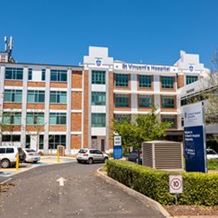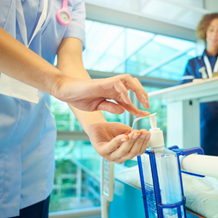Patient resources Patient Information & Safety- Receiving Antibiotics in Hospital
.png?mode=crop&width=375&height=222&quality=80)
- Home
- Our Hospitals
- St Vincent’s Private Hospital Toowoomba, QLD
- Patient Information
- Patient Information & Safety- Receiving Antibiotics in Hospital
Antibiotics are medicines that are used to treat or prevent infections. They work by killing or stopping the growth of ‘bugs’ (bacteria) that may be causing a problem in your body. Antibiotics do not kill viruses, so they should not be used to treat conditions like the common cold.
Different types of antibiotics are prescribed to treat different infections. They can be given as tablets, capsules, syrups, injections, creams, eye or ear drops.
Receiving antibiotics in hospital
Antibiotics are usually prescribed for treating a possible or known infection. Patients will often receive a ‘course’ of antibiotics. This means taking antibiotics for a set period of time or until the infection has completely gone.
Before you are prescribed antibiotics, blood tests, urine samples or wound swabs may be taken to try to work out which antibiotic is the best to treat the infection. The results of these tests may lead to your antibiotic treatment changing or stopping.
Advise your doctor, nurse or pharmacist about any allergies to medications you have had in the past. If you are taking an antibiotic and experience a rash, swelling of the throat/mouth, or other side effects, tell your doctor or nurse promptly.
If you are receiving antibiotic injections and you are eating and drinking without any restrictions, ask your doctor if it is possible to switch to oral antibiotics (e.g. tablets or capsules).
Sometimes antibiotics will be used to prevent an infection. If you are having a medical procedure that could increase your risk of infection, an antibiotic may be recommended before, during or shortly after the procedure, as per recommended guidelines. Your doctor may also recommend antibiotics if your immune system is too weak to fight off a serious infection.
Resistance to antibiotics
Antibiotics are different from other medicines, because misuse or overuse can make them less effective.
When bacteria develop new ways to defend themselves against antibiotics, it is called ‘antibiotic resistance’. This means that an antibiotic which used to work may no longer be able to cure your infection.
One of the main causes of antibiotic resistance is antibiotics being used when they are not needed (eg. for a common cold or flu). When you are in hospital, your doctor will discuss whether you need antibiotics based on your symptoms and test results.
How might antibiotic resistance affect me?
Some types of bacteria have become resistant to many different antibiotics. These bacteria are sometimes referred to as ‘superbugs’ in news and television reports.
Infections caused by superbugs are more difficult to treat and have a higher risk of complications.
Hospitals have tests they can perform which may indicate if you have a resistant infection. When test results become available, your doctor will review and discuss suitable treatment options. This may mean changing to a different antibiotic.
You should also clean your hands regularly and ask health professionals if they cleaned their hands before touching you. This can help prevent the spread of infections.
What do I need to know about my antibiotic treatment?
At the time of prescribing antibiotics, your doctor will discuss your individual needs and recommend a suitable product. Your doctor or pharmacist should also talk to you about:
- Why an antibiotic will be recommended for you
- The name of the antibiotic
- How it will be given to you while in hospital, and whether it should be taken with or without food
- How long you are likely to be on the antibiotic
- Side effects that you could experience
If you have not received this information, please ask your doctor, nurse or pharmacist.
Receiving antibiotics on discharge
BEFORE leaving the hospital
A treatment plan or information about your antibiotic should be discussed with you, including:
- Whether your antibiotic is being continued, changed or stopped on discharge
- How to take your antibiotic, including when to take it, for how long, if it should be taken with or without food and if you can drink alcohol while taking it
- Potential side effects, and what to do if they happen to you
- Follow-up advice, including when you need to be reviewed by your doctor
AFTER leaving the hospital
It is important that you:
- Take your antibiotics exactly as instructed on the label
- Set an alarm or ask family and friends to remind you if you have trouble remembering to take your antibiotics. To successfully fight infections, it is important that antibiotics are taken at the prescribed times
- Take the antibiotic for the length of time prescribed even if you feel better, unless your doctor tells you to stop
- Do not ‘stash’ any unused antibiotic doses: discard them, with your local pharmacy or your doctor
- Never share antibiotics with any other person, or take anyone else’s antibiotics
- Speak to your pharmacist or doctor about questions, concerns or side effects
Improving antibiotic use in hospitals
It is important that the right type and dose of antibiotic is used for each patient, and that these medicines are used only when necessary.
Efforts to improve antibiotic use are coordinated by doctors, nurses, pharmacists and hospital managers.
Related Content

Patient Information & Safety- Admission Information
Information about patient admission at St Vincent's Private Hospital Toowoomba.
Read More
Patient Information & Safety- Falls prevention
Information for patients about falls prevention.
Read More
Patient Information & Safety- Healthcare Associated Infections
Information about healthcare associated infections.
Read More
